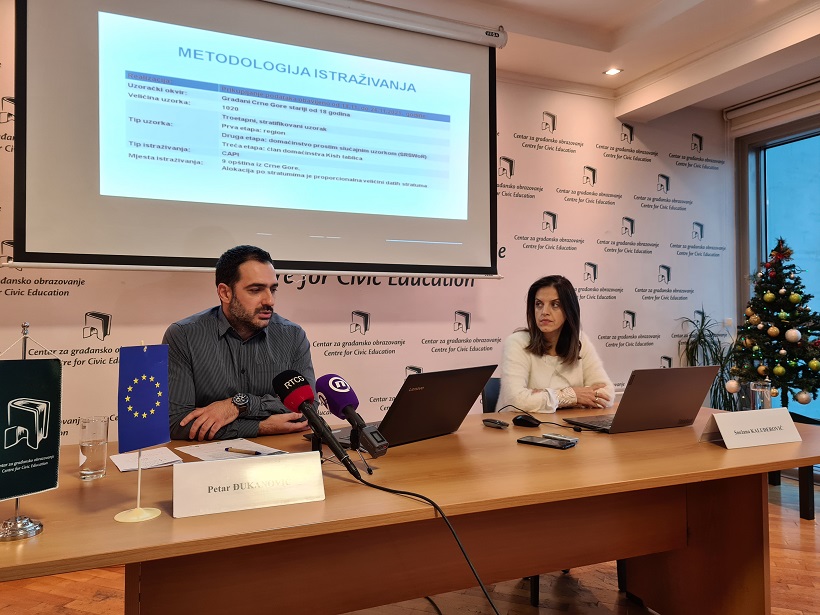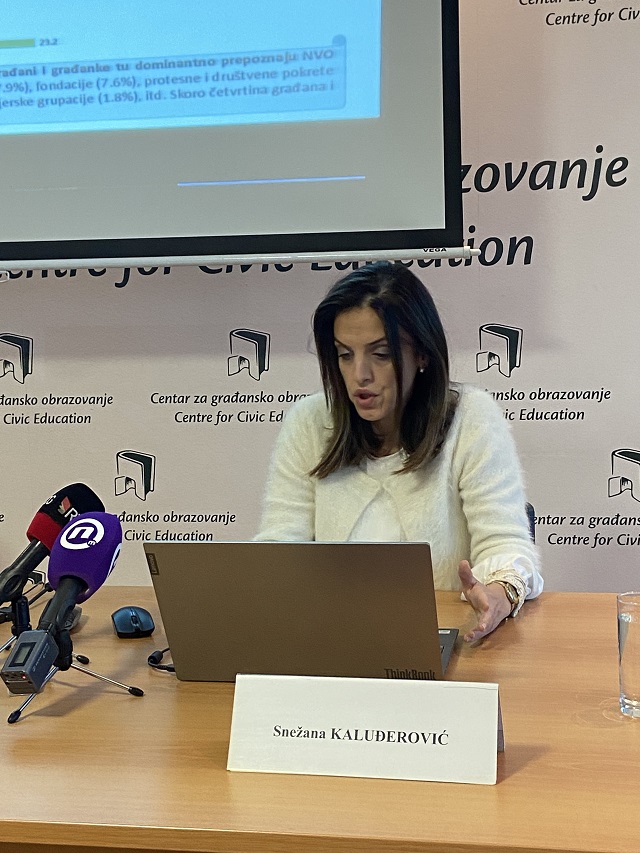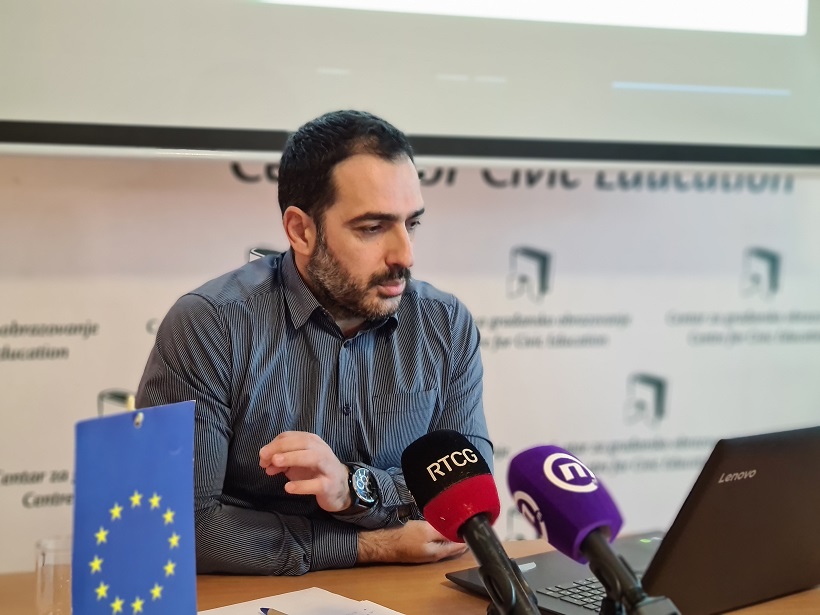“Citizens have less and less trust in institutions, they are burdened by socio-economic problems, NGOs are seen as the most prominent part of the civil sector and a positive attitude prevails about them, as well as that they are working in the public interest and having significant influence in Montenegrin society. The apathy and unwillingness of citizens for social activism is being noted, but also a strong desire for EU membership “, as underlined, among other issues, today at the presentation of a public opinion poll on the role of civil society in the process of democratization and Europeanization of Montenegro, wich Centre for Civic Education (CCE) with partners implemented within the project “CSOs in Montenegro – from basic services to policy shaping – M’BASE”, with the support of the EU Delegation to Montenegro and the Ministry of Public Administration, Digital Society and Media.
Petar Đukanović, Programme Director of CCE, in his review of the research findings, notes the overall decrease of trust of citizens in all institutions compared to the CCE’s previous researches. “The highest average score (2.54), on a scale of 1 to 5, have religious communities, followed by the education system, then the police and health, then the President of Montenegro, and non-governmental organisations (NGOs). Political parties, prosecution, media, judiciary and syndicates are the least trusted”, Đukanović said.
The greatest responsibility for the well-being of society lies in the Government (2.71 on a scale of 1 to 3), followed by the President (2.68) and the Parliament of Montenegro (2.67), which indicates that, regardless of trust, competencies and opportunities are well perceived, institutions. Banks, NGOs, the business sector and syndicates are considered to be the least responsible for the well-being of society. On the other hand, many different actors are key to promoting democracy, but primarily the Government, then the education system, media, and the President, then religious communities and NGOs.
The most important problems are those from the socio-economic sphere – unemployment (27%), the fight against corruption and organized crime (17.1%), improvement of living standards (13.5%), and health system (10.7%).
Snežana Kaluđerović, Senior Legal Adviser at CCE, states that the findings indicate that the majority of citizens are not generally or mainly informed about the work of the civil sector (57.4%), while a third of them (30.3%) are mostly or very informed, as the level of education increases so does awareness of the civil sector. TV, media portal and social media are the most important sources of information about NGOs.
‘’Although civil society is made up of numerous social actors, citizens predominantly recognize NGOs (44%), and in much smaller percentages trade unions (7.9%), foundations (7.6%), protest and social movements (5.8%), and the media (4.7%), professional associations (2.8%), religious groups (1.8%), etc. Almost a quarter of the citizens did not know which actors compose civil society”, Kaluđerović added.
In general attitude towards NGOs, the positive attitude of citizens and the assessment that NGOs work well (47.6%) prevails, while slightly more than a fifth (22%) is of the opposite opinion. Over a third of citizens (30.4%) are not determined concerning this issue. “Creating an attitude about an NGO is mostly influenced by the activities of that NGO (40.5%), followed by the perceived influence of that NGO on society (17.3%), but also the positions of the leader of that NGO (12.1%). The activities of NGOs are becoming more important with the growth of the educational level of citizens, while those without education are above average determining their attitude in relation to the positions of NGO leaders”, she explained.
The passive attitude of the citizens is worrying, so over half of them (54.7%) state that in the past 12 months they have not taken any action aimed at addressing a specific problem in their community, and some believe that such an action would not change anything.
“Citizens are divided in their assessment of the independence of NGOs from the government and political parties, and about many positions NGO are not currently determined. Significant percentages are those who believe that NGOs were critical of the previous government, but that they now are predominantly silent in their criticism, although many old problems remain. In determining the most important role of NGOs in society, the prevailing view (38.1%) is that NGOs should be sharp critics of the work of the Government, local governments, state bodies and institutions. This is followed by views that NGOs should monitor the work of the Government, local governments, state bodies and institutions (28.3%), and participate in the drafting of laws, strategies and other important acts and decisions (15.8%). Less than a fifth have no opinion on that”, Kaluđerović summed up.
The majority of citizens (45.1%) believe that NGOs work in their and the public interest, while almost a quarter believe that NGOs are in the service of the interests of their leaders. Slightly more than eighth are those who think that NGOs work in the interest of political parties, and every tenth respondent assesses that NGOs work in the interest of the Government.
Although the most recognizable work of NGOs is in the field of the fight against corruption, citizens believe that NGOs should be even more engaged in that field, but also in social care and humanitarian work.
“According to the perception of citizens, NGOs have considerable influence in society, i.e. cumulatively 43.8% of them recognize a certain type of NGO influence, which is disproportionate to the real possibilities of NGOs, but also a reflection of deficit of trust in the institutional framework. In addition to one-fifth, those who do not know how to determine that influence, while 37.7% estimate that NGOs have mostly or no influence at all. Finally, NGOs are predominantly recognized as necessary, important, knowledgeable, reliable, accessible, transparent and helpful, and citizens see them as modern and successful organizations. Attitudes are more divided about the speed of NGO work”, concluded Snežana Kaluđerović.
Citizens currently see the EU as the main donor to the NGO sector (34.7%), followed by the Government of Montenegro (16.5%), then international organizations (14%) and embassies of EU member states, UK, US and Canada (11%). When asked who should be the main donors, the order is similar, with a significant increase in the number of those (22.6%) who believe that the Government should take greater responsibility in this area, which is completely contrary to the Government’s plan to reduce next year budget allocations to NGOs by about 60%.
Among the issues that NGOs raise as the most important for democratization and Europeanization, citizens recognize the rule of law (25.3%), then human rights (20.7%), independence of the judiciary (13%) and the fight against corruption (11.2%), while less facing with the past (9.4%) and the responsibility of political decision-makers (6.8%).
“When it comes to the Government’s attitude towards NGOs, there is underlined position that this Government took over those NGOs and leaders who suited it, while it has a negative attitude towards others (24.2%). About a fifth of the respondents thinks that this Government does not have an attitude towards NGOs, and about a sixth (17.2%) that it is much more open to NGOs than the previous one. However, over a third cannot be determined on this issue”, stated Petar Đukanović.
Opinions are divided on the assessment of cooperation between the Government and NGOs, as well as the assessment of conditions for the development of NGOs that can freely criticize and limit the government when necessary.
Đukanović pointed out that more than ¾ citizens (77.3%) support Montenegro’s membership in the EU, and that the percentage of those who have a positive or mostly positive attitude towards the EU is even higher – 81.8%.
“The majority opinion is (66.3%) that Montenegro is moving slowly or very slowly in the accession negotiation process with the EU. However, the optimism of the citizens that we will become a member of the EU, compared to the perceived slow pace of that path, exists. Thus, 29.5% of them believe that Montenegro will become a member of the EU in five years, while 20.4% think that it will be in 10 years, and 12% in 20 years. Just over a fifth (22.6%) do not believe we will ever become a member of the EU.”, said Đukanović.
It seems that in these nine years of negotiations, citizens have learned who works what in this process, so most of them (35.7%) believe that the Government is most responsible for the dynamics of Montenegro’s accession to the EU. Slightly less than a fifth (18.2%) believe that it is the Parliament, and the approximate responsibility, according to citizens, is shared by the judiciary (11.3%) and political parties (10.9%). It is interesting and good that the citizens see themselves as very responsible for the accession process”, added Petar Đukanović.
A significant majority of citizens believe that NGOs have expertise/knowledge in the field of European integration (44%), but also the majority (40.4%) state that the authorities do not note the standpoints of NGOs on the European integration process and Montenegro’s commitments.
The dominant majority of Montenegrin citizens (52%) believe that social dialogue of trade unions, employers and government on development, wages, employment and decent work and labor and social rights as fundamental, democratic values and conditions for EU integration in Montenegro is mainly not or not at all developed.
Data collection was done by the DAMAR agency, from 18 to 24 November 2021, on a three-stage stratified random sample of 1,020 adult citizens of Montenegro from nine Montenegrin municipalities by application of the CAPI method.
The project “CSOs in Montenegro – from basic services to policy shaping – M’BASE“ is implemented by the CCE in partnership with the German Friedrich Ebert Stiftung (FES), the Center for Protection and Research of Birds of Montenegro (CZIP) and Politikon Network, in cooperation with the Ministry of Public Administration, Digital Society and Media and the European Integration Office of the Government of Montenegro. The project has EU financial support and co-financing from the Ministry of Public Administration, Digital Society and Media.
Maja Marinović, Programme Associate




